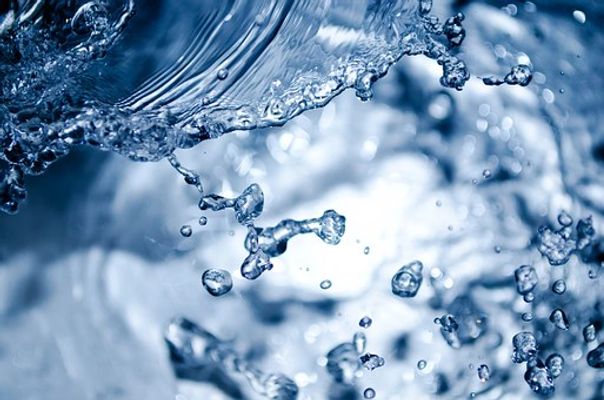3.5.2
Hydrogen Bonding & Carbonyls
Hydrogen Bonding and Carbonyls
Hydrogen Bonding and Carbonyls
Carbonyl compounds can form hydrogen bonds with water, and this affects their properties.
,h_400,q_80,w_640.png)
,h_400,q_80,w_640.png)
Pure carbonyls
Pure carbonyls
- Pure carbonyl compounds do not hydrogen bond to each other.
- This is because a hydrogen bond requires a hydrogen connected to a highly electronegative element like oxygen or nitrogen.
- Carbonyl compounds do not have these hydrogens.
- This means they have a low boiling point and are quite volatile.


In water
In water
- Carbonyl compounds dissolve in water because they can form hydrogen bonds with water.
- The oxygen of the carbonyl is attracted to the hydrogens of the water molecules.
- This means carbonyl compounds are highly soluble in water.
1Physical Chemistry
1.1Atoms, Molecules & Stoichiometry
1.2Atomic Structure
1.2.1Fundamental Particles
1.2.2Isotopes & Mass Number
1.2.3Electron Shells, Sub-Shells & Orbitals
1.2.4Electron Configuration
1.2.5Ionisation Energy
1.2.6Factors Affecting Ionisation Energies
1.2.7Trends of Ionisation
1.2.8Specific Impacts on Ionisation Energies
1.2.9Electron Affinity
1.2.10End of Topic Test - Atomic Structure
1.2.11A-A* (AO2/3) - Atomic Structure
1.3Chemical Bonding
1.3.1Ionic Bonding
1.3.2Covalent & Dative Bonding
1.3.3Shapes of Molecules
1.3.4Intermolecular Forces
1.3.5Intermolecular Forces 2
1.3.6Electronegativity
1.3.7Bond Length, Bond Energy, & Bond Polarity
1.3.8Metallic Bonding
1.3.9Physical Properties
1.3.10End of Topic Test - Bonding
1.3.11A-A* (AO2/3) - Bonding
1.4States of Matter
1.5Chemical Energetics
1.6Electrochemistry
1.7Equilibria
1.7.1Dynamic Equilibrium & Le Chatelier
1.7.2Kc
1.7.3Kp
1.7.4pH
1.7.5The Ionic Product of Water
1.7.6Weak Acids & Bases
1.7.7Introduction to Solubility Equilibria
1.7.8Solubility Equilibria Calculations
1.7.9Free Energy of Dissolution
1.7.10pH and Solubility
1.7.11Common-Ion Effect
1.7.12End of Topic Test - Kp & Electrochemistry
1.7.13A-A* (AO2/3) - Electrochemical Cells
1.8Partition Coefficient
1.9Reaction Kinetics
1.9.1Collision Theory
1.9.2Orders, Rate Constants & Equations
1.9.3Rate Graphs
1.9.4Rate Determining Step
1.9.5Maxwell-Boltzmann Distribution
1.9.6Catalysts
1.9.7Homogeneous Catalysts
1.9.8Heterogeneous Catalysts
1.9.9End of Topic Test - Kinetics
1.9.10End of Topic Test - Rate Equations
1.9.11A-A* (AO2/3) - Rate Equations
2Inorganic Chemistry
2.1The Periodic Table
2.2Group 2
2.3Group 17
2.4Transition Metals
3Organic Chemistry & Analysis
3.1Introduction to Organic Chemistry
3.2Hydrocarbons
3.2.1Fractional Distillation
3.2.2Cracking
3.2.3Combustion
3.2.4Chlorination
3.2.5End of Topic Test - Alkanes
3.2.6Introduction to Alkenes
3.2.7Reactions of Alkenes
3.2.8Polymerisation Reactions
3.2.9End of Topic Test - Alkenes
3.2.10Arenes
3.2.11Evidence for Structure of Arenes
3.2.12Reactions of Benzene
3.2.13End of Topic Test -Arenes
3.3Halogen Derivatives
3.4Hydroxy Compounds
3.5Carbonyl Compounds
3.6Carboxylic Acids & Derivatives
3.7Nitrogen Compounds
3.8Polymerisation
3.9Analytical Techniques
3.9.1Chromatography
3.9.2High-Performance Liquid Chromatography
3.9.3Gas Chromatography
3.9.4IR Spectroscopy
3.9.5Uses of IR Spectroscopy
3.9.6Mass Spectrometry
3.9.7Mass Spectrometry Analysis
3.9.8Nuclear Magnetic Resonance
3.9.9Carbon-13 NMR
3.9.10Proton NMR I
3.9.11Proton NMR II
3.9.12End of Topic Test - Analytical Techniques
3.9.13A-A* (AO2/3) - Analytical Techniques
Jump to other topics
1Physical Chemistry
1.1Atoms, Molecules & Stoichiometry
1.2Atomic Structure
1.2.1Fundamental Particles
1.2.2Isotopes & Mass Number
1.2.3Electron Shells, Sub-Shells & Orbitals
1.2.4Electron Configuration
1.2.5Ionisation Energy
1.2.6Factors Affecting Ionisation Energies
1.2.7Trends of Ionisation
1.2.8Specific Impacts on Ionisation Energies
1.2.9Electron Affinity
1.2.10End of Topic Test - Atomic Structure
1.2.11A-A* (AO2/3) - Atomic Structure
1.3Chemical Bonding
1.3.1Ionic Bonding
1.3.2Covalent & Dative Bonding
1.3.3Shapes of Molecules
1.3.4Intermolecular Forces
1.3.5Intermolecular Forces 2
1.3.6Electronegativity
1.3.7Bond Length, Bond Energy, & Bond Polarity
1.3.8Metallic Bonding
1.3.9Physical Properties
1.3.10End of Topic Test - Bonding
1.3.11A-A* (AO2/3) - Bonding
1.4States of Matter
1.5Chemical Energetics
1.6Electrochemistry
1.7Equilibria
1.7.1Dynamic Equilibrium & Le Chatelier
1.7.2Kc
1.7.3Kp
1.7.4pH
1.7.5The Ionic Product of Water
1.7.6Weak Acids & Bases
1.7.7Introduction to Solubility Equilibria
1.7.8Solubility Equilibria Calculations
1.7.9Free Energy of Dissolution
1.7.10pH and Solubility
1.7.11Common-Ion Effect
1.7.12End of Topic Test - Kp & Electrochemistry
1.7.13A-A* (AO2/3) - Electrochemical Cells
1.8Partition Coefficient
1.9Reaction Kinetics
1.9.1Collision Theory
1.9.2Orders, Rate Constants & Equations
1.9.3Rate Graphs
1.9.4Rate Determining Step
1.9.5Maxwell-Boltzmann Distribution
1.9.6Catalysts
1.9.7Homogeneous Catalysts
1.9.8Heterogeneous Catalysts
1.9.9End of Topic Test - Kinetics
1.9.10End of Topic Test - Rate Equations
1.9.11A-A* (AO2/3) - Rate Equations
2Inorganic Chemistry
2.1The Periodic Table
2.2Group 2
2.3Group 17
2.4Transition Metals
3Organic Chemistry & Analysis
3.1Introduction to Organic Chemistry
3.2Hydrocarbons
3.2.1Fractional Distillation
3.2.2Cracking
3.2.3Combustion
3.2.4Chlorination
3.2.5End of Topic Test - Alkanes
3.2.6Introduction to Alkenes
3.2.7Reactions of Alkenes
3.2.8Polymerisation Reactions
3.2.9End of Topic Test - Alkenes
3.2.10Arenes
3.2.11Evidence for Structure of Arenes
3.2.12Reactions of Benzene
3.2.13End of Topic Test -Arenes
3.3Halogen Derivatives
3.4Hydroxy Compounds
3.5Carbonyl Compounds
3.6Carboxylic Acids & Derivatives
3.7Nitrogen Compounds
3.8Polymerisation
3.9Analytical Techniques
3.9.1Chromatography
3.9.2High-Performance Liquid Chromatography
3.9.3Gas Chromatography
3.9.4IR Spectroscopy
3.9.5Uses of IR Spectroscopy
3.9.6Mass Spectrometry
3.9.7Mass Spectrometry Analysis
3.9.8Nuclear Magnetic Resonance
3.9.9Carbon-13 NMR
3.9.10Proton NMR I
3.9.11Proton NMR II
3.9.12End of Topic Test - Analytical Techniques
3.9.13A-A* (AO2/3) - Analytical Techniques
Unlock your full potential with Seneca Premium
Unlimited access to 10,000+ open-ended exam questions
Mini-mock exams based on your study history
Unlock 800+ premium courses & e-books